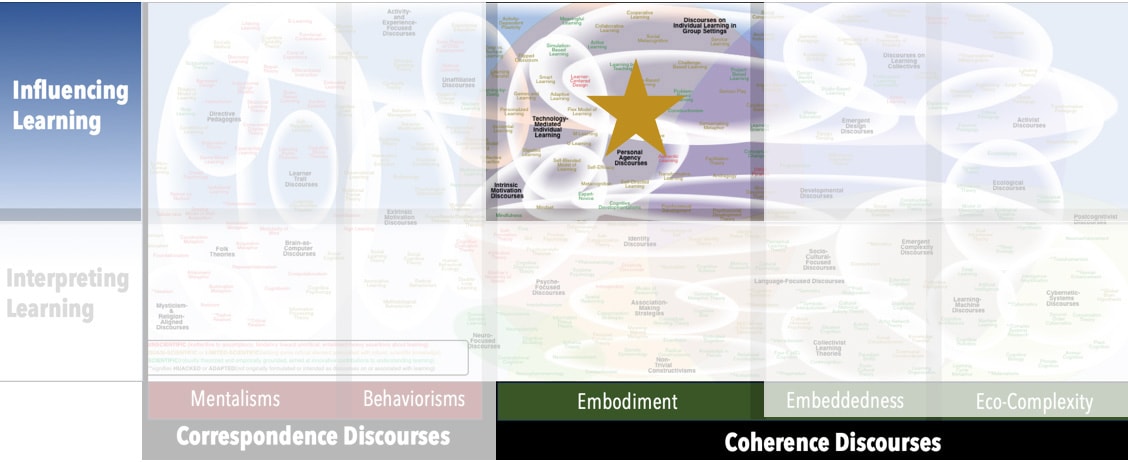AKA
Autodidacticism
Autodidactism
Autonomous Learning
Heutagogy
Independent Learning
Self-Determined Learning
Self-Direction
Self-Education
Self-Learning
Self-Teaching
Focus
Individuals assuming responsibility for their own learningPrincipal Metaphors
Most versions of Self-Directed Learning are not explicit about or aligned with any specific theory of learning – and, consequently, direct references to learning are frequently suggestive of Folk Theories, especially the Acquisition Metaphor and the Attainment Metaphor. The following cluster works across the literature on Self-Directed Learning that we reviewed:- Knowledge is … material; objectified facts; pre-determined goal
- Knowing is … accumulation (of previous learnings); progress
- Learner is … an accumulator (individual); progressor
- Learning is … acquiring/attaining
- Teaching is … supporting
Originated
1100s as a general idea; 1970s as a modern theorySynopsis
As its name suggests, Self-Directed Learning is about individuals taking responsibility for their own educations – which entails some level of control over selecting topics of study, structuring inquiries, organizing resources, managing time, and so on. In a formal educational setting, these decisions are made in collaboration with a teacher, whose main role shifts from administering a curriculum to supporting the development of skills, processes, and mindsets to ensure success and to enable the learner to assume more and more autonomy. Subdiscourses include:- Learner Control – a notion derived by combining Self-Directed Learning, Technology-Mediated Individual Learning, and Design-Based Learning that refers to the extent to which a user of an educational technology can determine which links to take, which order to take them, and the pace of progress.
- Professional Growth Plan (PGP; Teacher Professional Growth Plan; TPGP) – rooted in a Self-Directed Learning sensibility, a self-defined plan for one’s personal professional learning that typically comprises activities to advance expertise and qualifications, as well as details on ensuring relevant documentation
- Self-Instruction – a mash-up of Self-Talk, Self-Regulated Learning, and Self-Directed Learning, Self-Instruction is a collection of techniques intended to support learners in taking more control over their learning experiences, largely by talking themselves through tasks, activities, and frustrations
- Self-Instructional Training (various, 1980s) – an instructional sequence (and therapeutic technique) that starts with the explicit assistance of a teacher/coach, gradually moving from explicit instruction through guided self-talk to internalized and self-generated guidance
- Side Learning (Yale University, 2010s) – a type of Self-Directed Learning that is focused on elaborating one’s range of expertise in order to expand one’s career possibilities. (The name is a play on the notion of “earning on the side.”)
- Staged Self-Directed Learning Model (Gerald Grow, 1990s) – a mashup of Learning Styles Theories, Self-Directed Learning, and Teaching Styles Discourses, resulting in model that matches four types of learner (Dependent; Interested; Involved; Self-Directed) with four modes of teaching (Authority-Expert; Motivator-Salesman; Facilitator; Delegator)
- Tangential Learning – a category of Self-Directed Learning that applies to those pursuits triggered by, but tangential to other (typically more formal) learning engagements
Commentary
Self-Directed Learning is most commonly seen as an adult aspiration in western cultures – and so, with regard to schooling, it might be better framed as a developmental sequence than an alternative to teacher- or institution-directed education.Authors and/or Prominent Influences
Malcolm KnowlesStatus as a Theory of Learning
Self-Directed Learning is not a theory of learning.Status as a Theory of Teaching
Self-Directed Learning is a perspective on influencing learning – one that comes with a specific and prescriptive conception of teaching.Status as a Scientific Theory
Self-Directed Learning is an ideal, not a scientific theory. While there is evidence that individuals who achieve a high level of autonomy in the their own educations are, in general, more content and most successful, it is not at all clear how Self-Directed Learning might be effectively nurtured. Nor is clear how much influence that teachers and schools can have in supporting its development.Subdiscourses:
- Learner Control
- Professional Growth Plan (PGP; Teacher Professional Growth Plan; TPGP)
- Self-Instruction
- Self-Instructional Training
- Side Learning
- Staged Self-Directed Learning Model
- Tangential Learning
Map Location

Please cite this article as:
Davis, B., & Francis, K. (2024). “Self-Directed Learning” in Discourses on Learning in Education. https://learningdiscourses.com.
⇦ Back to Map
⇦ Back to List
